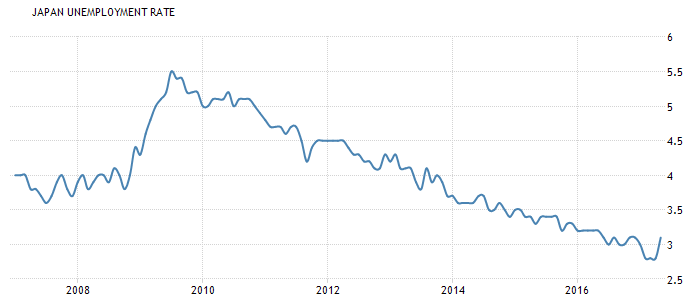
I’ve done a number of posts pointing to the folly of using the Phillips curve to predict inflation in the US. People are making the same mistake in Japan, assuming that a stronger labor market will lead to higher inflation:
The Bank of Japan’s nine-member board will seek to explain why the strength in the economy has yet to translate into inflation, a dilemma they are struggling with as wages and prices remain stubbornly weak, say sources familiar with its thinking.
“Given the economy is in such a good shape, it’s hard to explain why inflation remains so weak. This will be among key topics of debate at this month’s BOJ meeting,” said one of the sources, a view echoed by two other sources.
Actually, it’s not at all hard to explain. Nominal GDP growth in Japan remains very weak, and that’s what is leading to low inflation. Monetary policy is too tight
Many Keynesians get the Phillips curve backwards. They think that real changes (such as lower unemployment) have nominal consequences (higher inflation.) Milton Friedman saw things differently. Unexpected changes in nominal variables (inflation) cause real effects (unemployment.) I think he’s basically correct, although I’d replace inflation with NGDP growth.
Don’t use real variables to predict nominal variables.

READER COMMENTS
Garrett
Jul 5 2017 at 10:26am
As a former student, one thing I have to thank Prof Sumner for is explaining the issues with the Phillips curve early on in Bentley’s Monetary Economics class. Every Economics major had to take that class (but not all with Sumner), so I hope other Bentley students aren’t making this error.
marcus nunes
Jul 5 2017 at 10:57am
Low unemployment, the root of all evil?
http://ngdp-advisers.com/2017/06/06/low-unemployment-root-evil/
marcus nunes
Jul 5 2017 at 11:08am
The P-C is mythical. NGDP is tangible!
https://thefaintofheart.wordpress.com/2014/10/14/the-mythical-phillips-curve-or-the-tangible-ngdp/
Miguel Madeira
Jul 5 2017 at 11:57am
Well, in my first month of my first year of college, what I learn was that the relation was low unemployment → increasing inflation (because low unemployment means that workers could successfully demand higher wages).
Don Geddis
Jul 5 2017 at 1:51pm
Miguel Madeira: That’s the (discredited) theory of “cost-push” inflation. Whatever little sense it might make in a gold-standard economy, it doesn’t work at all in an economy with fiat currency. Central bank choices for the size of the money supply completely overwhelm any minor factors like workers “demanding” higher wages. Those wage increases won’t happen, if firms aren’t receiving sufficient revenues to pay their labor costs.
Scott Sumner
Jul 5 2017 at 4:16pm
Thanks Garrett. Always good to hear from a former student, and you were one of my best.
Comments are closed.